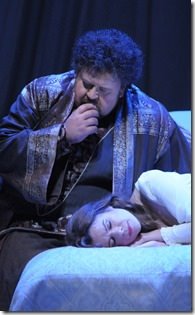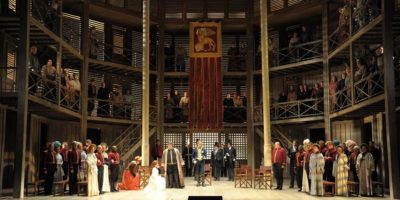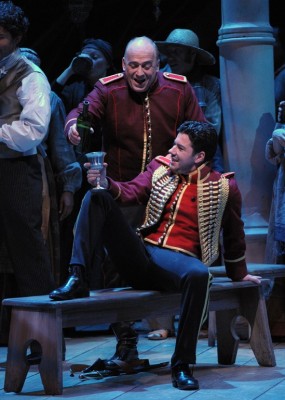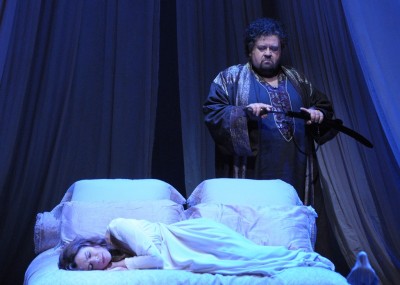Otello

Music by Giuseppe Verdi
Libretto by Arrigo Boito,
after William Shakespeare’s tragedy
Conductor: Bertrand de Billy
Director: Ashley Dean
At the Lyric Opera of Chicago
Verdi’s masterwork
Verdi’s Otello, his last opera excepting Falstaff, is in spite of its points of departure from Shakespeare’s iconic play an overpowering tragedy in its own right. Not only does Arrigo Boito’s fine libretto draw truly vivid, compelling, and, when appropriate, sympathetic portraits of Iago, Desdemona, and Othello, but the musical score commands an extraordinary degree of dramatic and expressive intensity. Indeed, in this opera Verdi emerged from his nearly two-decade-long hiatus from composition with a thoroughly renewed musical palette. This is no collection of lovely but repetitive arias and stock choruses strung together with straightforward orchestral accompaniment (as, to put it perhaps too unkindly, some of his earlier work, not expecting Rigoletto or even Aida, can border upon, for all his melodic gifts). The orchestral writing alone is breathtaking for its complexity and nuance of texture and color: particularly memorable are the absolutely gorgeous effects obtained from the strings in the conclusion of the Act I love-duet, but through the course of the opera one constantly hears well-drawn color contrasts between, say, the various woodwinds, and the orchestral tellingly fills in the stage drama in most imaginative ways. Rather like some of Wagner, one could listen to the entire opera merely for the orchestral part.
Thankfully, Verdi’s masterful scoring was for the most part beautifully served in the Lyric Opera’s current production. The Lyric orchestra often makes up with warmth and style what it may lack in absolute virtuosity, and it is generally at its most impressive in the later Romantic repertoire, where color is so important. While more incisive articulation may perhaps have been welcome at points, there was little to complain about, and much to commend, in its performance of Otello under French conductor Bertrand de Billy, who is making his Lyric debut with these performances. The playing throughout was alert and sensitive to the shifts in emotional tone, from the frenzied electricity of the big choral scenes to the intimacy of much of the rest of the opera. The strings retained their warmth in the high register, where Verdi often sends them (to excellent effect); the wind soloists were impeccable; the brass were full and secure.
The lead singers formed an interesting group. Tenor Johan Botha, in the title role, has most frequently been heard at the Lyric of late in Wagner (last year’s Die Meistersinger von Nürnberg and 2011’s Lohengrin), and in some ways his voice may be more suited to that repertoire, as it lacks the utmost of gracefulness and beauty of tone. However, he was not short on conviction or power, and conveyed all his character’s passion and rage even if, for instance, his contribution to the love duet could have been more naturally tender and lovely.
His Desdemona, by contrast, Ana María Martínez – making her role debut – brought an essentially lyric voice that may disappoint those hoping for a true dramatic soprano in this role. But with the exception of some shrillness in Act I, she sang beautifully and with a certain sweetness that, to my ears, reflected the innocence and earnestness of her character perfectly – and she certainly delivered the ardor and terror Desdemona must project in the fourth act.
While tenor Antonio Poli as Cassio also made a fine impression in his American operatic debut, in some ways the finest of the cast was bass-baritone Falk Struckmann in the role of Iago. He projected his character’s villainy with hearty relish rather than overt menace but was nonetheless effective for that; there is at least a touch of the comic villain in Iago’s single-minded appetite for wickedness, and Struckmann reflected this without diminishing the fear invoked in his audience. Most impressively, he combined this with both powerful projection and an underlying musical warmth and gracefulness that made his singing most ingratiating, particularly in contrast to Botha’s powerful but a touch unwieldy singing. On the whole, however, the leads complemented each other well to deliver Verdi’s Shakespearean masterpiece in full force, abetted by the orchestra’s fine performance under de Billy, making for a most worthwhile afternoon (or evening) of true music-drama.
Highly Recommended.
Samuel Wigutow
At the Lyric Opera of Chicago, 20 N Wacker Dr, Chicago, IL , (312) 332-2244, https://www.lyricopera.org/ , tickets $44 – $264, running time approximately three hours with one intermission, through November 2, 2013.



